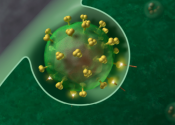Nanoparticles loaded with bee venom kill HIV
(Medical Xpress)—Nanoparticles carrying a toxin found in bee venom can destroy human immunodeficiency virus (HIV) while leaving surrounding cells unharmed, researchers at Washington University School of Medicine in St. ...
Mar 8, 2013
3
0









